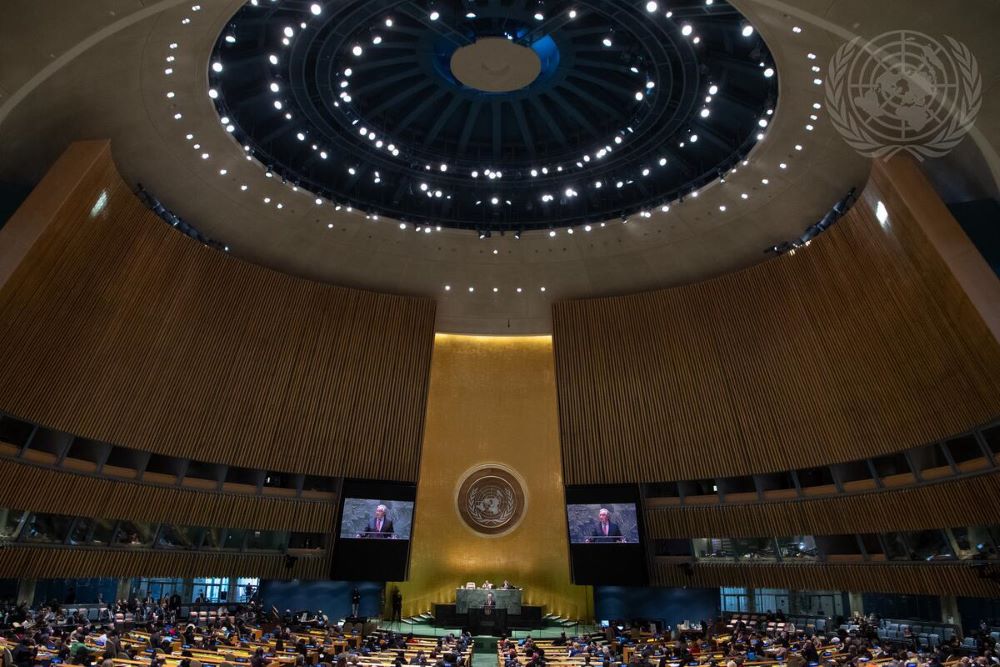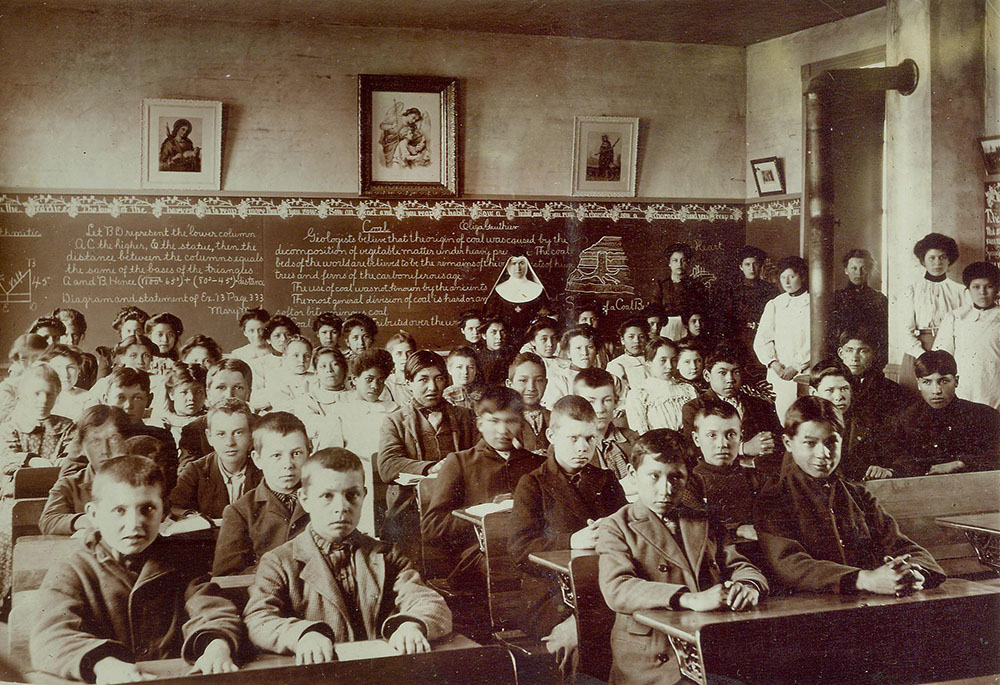
A wide view of the United Nations General Assembly Hall in New York City as Secretary-General António Guterres (on screens) addresses the opening of the 66th session of the Commission on the Status of Women in March 2022. This year's meetings will take place March 6-17. (UN photo)
Editor's note: Global Sisters Report's Monday Starter is a feature from GSR staff writers that rounds up news from or about women religious that you may otherwise have missed.

Catholic sisters representing their congregations at the United Nations will participate in events March 6-17 during the Commission on the Status of Women, the U.N.'s annual forum promoting gender equality and the empowerment of women.
The priority theme for this year's meetings, the commission's 67th, focuses on innovation, technological change and education in the digital age as a way to achieve gender equality and the empowerment of women and girls.
Meetings will be a mix of online and in-person events in and around United Nations headquarters in New York City. In-person events will include formal United Nations meetings; so-called "side events" on U.N. premises by U.N. permanent missions, intergovernmental organizations and U.N. bodies; and "parallel events" organized by nongovernmental groups, such as sister congregations.
"The active participation of non-governmental organizations (NGOs) is a critical element in the work of the Commission on the Status of Women," said UN Women, the United Nations' body on gender equality. "They continue to play an important role in holding international and national leaders accountable for the commitments" they made during the meetings.
In recent years, many commission-related events have been conducted online because of the pandemic, but this year will see a return to more in-person participation. As one example, Dominican sisters from the United States, Vietnam, South Africa and Zimbabwe will participate in person, said Adrian Dominican Sr. Durstyne "Dusty" Farnan, the United Nations' representative for the Dominican Leadership Conference.
"There is no doubt that gender inequality still impacts women severely. It is noticeable in the church and all of society," Farnan told Global Sisters Report in an email. "The Commission on the Status of Women helps us all continue to work for equality for all."
At least two congregations plan to hold online events during the commission's meetings:
- The Sisters of the Good Shepherd will host a meeting via Zoom at 8 a.m. Eastern time on Friday, March 10, focusing on ministries to girls. Register here.
- At 8 a.m. Eastern time on Tuesday, March 14, Dominican Sisters will share their experience of working with rural women in Honduras, Ecuador, Pakistan and Burkina Faso. Translation will be available in French, Spanish and English. Join the Zoom call here.

Sr. Macaria Murphy, a Franciscan Sister of Perpetual Adoration, poses with students and lay staff in a classroom at St. Mary's Catholic Indian Boarding School in Odanah, Wisconsin, in this undated photo. (Courtesy of the Franciscan Sisters of Perpetual Adoration)
Collection of oral histories of Native boarding school survivors
White society has largely ignored or deliberately hidden the history of Native American boarding schools in the United States, a nearly centurylong effort to destroy Native culture. Now, thanks to an investigation by the U.S. Department of the Interior, that history is starting to come to light.
As a response, the National Native American Boarding School Healing Coalition is collecting powerful oral histories of survivors and their descendants. "Voices from Pezihutazizi Oyate: Boarding School Histories" is a nine-minute collection of excerpts from a 90-minute documentary of the same name featuring members of the Upper Sioux Community.
About half of the more than 400 boarding schools were run by Christian organizations, many of them Catholic. Research by GSR found at least 56 schools connected to Catholic women religious from 33 different congregations.
The government forced children to attend the schools, threw out their traditional clothing and cut their long hair, and punished them for speaking any language other than English or for practicing Native traditions or religions.
According to the Department of Interior, corporal punishment, including solitary confinement, withholding food, and whipping and other physical abuse were common at the school. More than 500 children died at the schools, a number that is expected to rise.
A statement with "Voices from Pezihutazizi Oyate: Boarding School Histories" states that as these truths come out, many Native nations are reclaiming their voices.
"This mini documentary explores community interpretations of this boarding school past and offers hope for justice and healing," it says.
Anti-government protesters clash with police in Lima, Peru, on Jan. 21 as they demand the release of protesters detained in demonstrations supporting ousted former President Pedro Castillo. (OSV News photo/Reuters/Sebastian Castaneda)
Mercy sisters decry 'massacre' in Peru
The Prophetic Voice Commission, a group representing Mercy Sisters and associates in Latin America and the Caribbean, has released a statement on the turmoil in Peru, where there has been a "massacre of indigenous people and other activists in Peru, caused by a government that continues to trample human rights with impunity," the statement says.
The former president of Peru attempted to dissolve Congress, which then removed him from office and arrested him, setting off protests over his removal and debate over whether his efforts amounted to a coup or if Congress was illegitimate. The police and military have been violently cracking down on protesters, killings dozens of people in the process.
Advertisement
"It is outrageous and painful to see the violent and excessive repression of peaceful demonstrations which caused the death of our Peruvian brothers, including minors, as well as persecution of indigenous activists and university students. And the authorities have begun to militarize some regions," the Mercy Sisters' statement says.
"Those responsible for the mistreatment, arbitrary arrests, and the death of more than 55 people should be brought to justice even if they are politicians, police officers or members of the armed forces."
At times, the situation and the statement echo the turmoil of Central and South America in the 1970s and 1980s, when priests and religious aligned with the poor and Indigenous against government oppression.
"May the impoverished and indigenous people continue demanding their rights peacefully and with dignity, that the government with blood on its hands resign," the sisters' statement says. "We ask for sincere dialogue, respect for multiculturalism and a sound political system that seeks a fairer society that can achieve peace and democracy."








